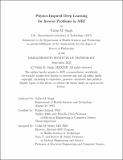| dc.contributor.advisor | Golland, Polina | |
| dc.contributor.author | Singh, Nalini M. | |
| dc.date.accessioned | 2023-11-02T20:16:14Z | |
| dc.date.available | 2023-11-02T20:16:14Z | |
| dc.date.issued | 2023-09 | |
| dc.date.submitted | 2023-09-07T20:20:47.216Z | |
| dc.identifier.uri | https://hdl.handle.net/1721.1/152787 | |
| dc.description.abstract | We demonstrate the power of combining the forward image acquisition model with deep learning solutions for inverse problems in magnetic resonance imaging (MRI), from individual network layers to the network architecture design and inference procedure.
First, we propose neural network layers that combine image space representations with representations in Fourier space, where MRI data is acquired. These layers can be used as drop-in replacements for standard image space convolutions in a variety of network architectures and yield higher quality reconstructions across a wide range of MR imaging tasks.
Next, we demonstrate a deep learning framework for rigid-body motion correction in MRI, where the forward imaging model informs both the network architecture and the inference procedure. Our method incorporates potentially unknown motion parameters as inputs to the network and then optimizes them for each test example. The optimization is performed via an objective function that forces the reconstructed image and estimated motion parameters to be consistent with the acquired data. This approach reduces the joint image-motion parameter search used by most motion correction strategies to an inference-time search over motion parameters alone, greatly simplifying the complexity of the optimization problem to be solved for a novel image. Our hybrid method achieves the high reconstruction quality metrics that characterize deep learning solutions while retaining the benefits of explicit model-based optimization – in particular, the ability to reject examples where the network produces poor reconstructions. Experiments demonstrate the advantages of this combined approach over purely learning or model-based reconstruction techniques. | |
| dc.publisher | Massachusetts Institute of Technology | |
| dc.rights | In Copyright - Educational Use Permitted | |
| dc.rights | Copyright retained by author(s) | |
| dc.rights.uri | https://rightsstatements.org/page/InC-EDU/1.0/ | |
| dc.title | Physics-Inspired Deep Learning for Inverse Problems in MRI | |
| dc.type | Thesis | |
| dc.description.degree | Ph.D. | |
| dc.contributor.department | Harvard-MIT Program in Health Sciences and Technology | |
| mit.thesis.degree | Doctoral | |
| thesis.degree.name | Doctor of Philosophy | |
